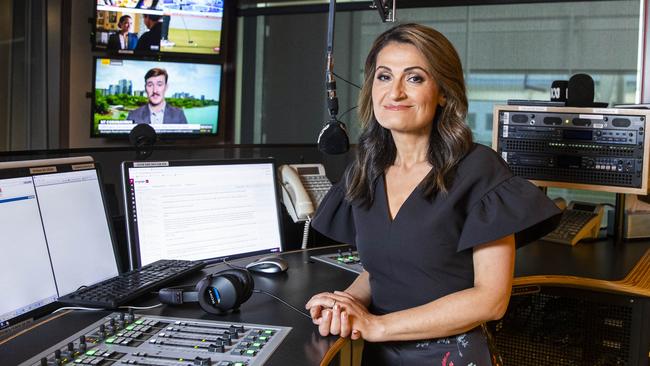Patricia Karvelas says Aboriginal Australians should be in the ‘driver’s seat’ of Indigenous issues
ABC radio national breakfast host Patricia Karvelas said it’s up to the media to focus on “fairness and accuracy” in the lead up to the Voice to parliament referendum.

ABC broadcaster Patricia Karvelas says debates involving Indigenous Australians have for too long been dominated by the views of white people and this must change as the country prepares for the national referendum on the voice to parliament.
“We don’t need to hear about Indigenous Australia always and only through the prism of white Australia. So much of our country has been explained this way already,” she said.
“For many years I was an Indigenous affairs reporter as a non-Aboriginal person, I have with hindsight and the benefit of years of experience considered the complexity of that position.
“I believe strongly now that we must have Aboriginal Australians in the driver’s seat of reporting on their own communities”.
Karvelas, who was recently appointed an honorary professor at RMIT’s school of media and communication, made the comments during her inaugural lecture in Melbourne last week.
The event was led by the RMIT’s journalism lecturer and programs manager, associate professor Alexandra Wake, who shared to the audience her disbelief that anyone would oppose supporting the voice to parliament.
“I just thought that everyone would be voting for the voice and I can’t even understand why there is a debate and yet now, there is so many sides to that and it’s starting to get nasty,” she told the attendees.
Karvelas noted the immense changes she had seen in the recognition of Indigenous Australians in recent years.
“When I started working as a journalist 23 years ago, the acknowledgment of country was rarely heard, now it’s commonplace, that’s how significant the shift has been in the way we think about Australia,” she said.
Karvelas said the media had a significant role to play in reporting the referendum debate fairly and it should hear a range of views – both for and against – on the issue.
“Our job will be having a conversation that involves all of Australia and centres the voices and lives of Indigenous Australians,” she said.
“We also have a responsibility to report on this debate with an acute focus on accuracy and fairness; it is our job to provide the facts and allow Australians who all get a vote to make up their own minds.”
It was revealed in The Australian last month that ABC staff were receiving “impartiality” training on the voice to parliament, via a “deep-dive” session to discuss “some knotty editorial policy issues”, with reporters warned not to favour one particular view on the issue.
Karvelas said the ABC provided “really good solid, editorial guidance” on the reporting on the referendum and noted most Indigenous Australians support enshrining a voice to parliament.
“The fact is the consensus view of Indigenous Australians at a massive convention in the middle of Australia was that this was the right proposal — that is the mainstream view of Aboriginal Australia,” she said.
“All ‘no’ campaigners are welcome on my show and I want to hear their views. Some have declined the invitations and that’s on them.”
Karvelas said she had spoken to Indigenous elders who were disgruntled with reporting on issues in their communities, and journalists “swanning in, trying to win an award and departing because the drama has gone”.
She cited an example of the coverage of alcohol and crime issues in Alice Springs that made national headlines recently.
“Here was a tabloid story of epic proportions, it had crime, alcohol abuse, pictures of youths being lawless on the streets breaking the law, it was a story that needed to be told,” she said.
“The underplaying of the story that led to that moment … those stories were not the focus of frenzied coverage in the national media, you could barely find one in the weeks before about foetal alcohol syndrome.”
However she made no mention of the ABC’s white supremacy reports from an Alice Springs community meeting which caused outrage and resulted in the public broadcaster having to edit stories and issue a public apology to their audiences “for providing an incomplete picture of the event in this instance”.





To join the conversation, please log in. Don't have an account? Register
Join the conversation, you are commenting as Logout